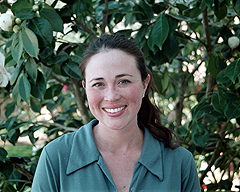|
April 26, 2004
Dedicated teacher returns to school for Ph.D.
in education
By Jennifer McNulty
Done with college and interested in teaching, Anne Rios ignored her
friends and signed up to be a substitute teacher.
|

Anne Rios is
the daughter of immigrants from Peru and Costa Rica. Photo
by Jennifer McNulty
|
“All my friends told me not to do it--they said being a substitute
was the worst way to learn about teaching and that I’d never go
into it if I started that way,” recalled Rios.
They were wrong.
As a substitute teacher in the San Mateo County Unified School District,
Rios encountered a large number of minority students and recent immigrants
who were making their way through high school with limited English skills.
Rios, the daughter of immigrants from Peru and Costa Rica, could relate
to what the students were experiencing, and she wanted to help them.
“I wanted those students to feel a sense of pride and affirmation
of their native language. It’s an opportunity I certainly never
had,” said Rios, who grew up in the San Francisco suburb of Millbrae,
speaking Spanish at home and spending six to eight months a year in
her mother’s native Costa Rica.
“I was one of only three nonwhite students in my grade school,”
she explained.
“When I was in second grade, I was reading below grade level.
The principal told my mom I needed more stability and to stop taking
me to Costa Rica. He told her we should speak English at home. After
that, we only went to Costa Rica for the summer.”
Although Rios’s academic performance improved, educators today
are critical of such culturally insensitive guidance. Inspired by the
needs she saw while substitute teaching, Rios began exploring graduate
schools, hoping to learn a better way to help students. At UCSC, she
found what she was looking for in the Education Department’s focus
on culture and race. She enrolled in the master’s in education
program and earned her degree and a teaching credential in 2000.
Fluent in Spanish, Rios immediately got a job teaching third grade
in a “dual immersion” class at Alianza Elementary School in
Watsonville.
Alianza’s high percentage of native Spanish-speaking students,
including a large number of newly arrived immigrants from Mexico, made
it impossible for Rios to strike the targeted 60/40 balance of Spanish-
and English-language instruction expected for third grade. Frustrated,
Rios worked hard to reach out to the students, making frequent home
visits to get to know parents. Sometimes what she saw took her breath
away.
“A lot of the kids were sick all the time, and when I saw their
housing, I understood why,” said Rios. “I remember one place--there
were literally holes in the floor. Seeing that showed me a lot about
the resiliency of the human spirit, that those children were still coming
to school and doing their best.”
Determined to match the children’s effort, Rios and her colleagues
made some changes. They increased continuity by agreeing to instruct
the same group all day instead of rotating children through their classrooms
by topic. Children were encouraged to spend more time working together
in teams. And teachers focused on directing instruction at each child’s
level. The changes improved the quality of instruction and learning,
and increased Rios’s job satisfaction.
“It was like night and day,” she said.
Even so, Rios couldn’t shake her desire to explore more deeply
the issues of culture, language, and race that are shaping education
across the United States. Rios returned to UCSC in 2003 as one of nine
students in the campus’s new doctoral program in education.
“I think it was always in the back of my mind that there were
questions I wanted to explore--things I couldn’t do as part of
my profession,” said Rios. “My experience as a teacher has
given me a new lens for viewing these issues. It has really been a powerful
asset for understanding.”
Nearing the end of her first year, Rios is drawn to the social context
of education, a focus shared by her adviser and mentor June Gordon,
an associate professor of education, and by Margaret Gibson, a professor
of education and anthropology.
New research on racial and ethnic identity is broadening understanding
of what students need and how schools can foster student success.
Addressing the needs of a diverse student population and California’s
many English-language learners is at the heart of the UCSC Education
Department. “The faculty here are really accessible and approachable.
It’s true,” said Rios, who earned her B.A. in psychology from
UC Davis.
Rios, 30, dreams of doing dissertation research among students of Japanese
descent in Peru and Brazil. “Notions of the ‘model minority’
have emerged in Latin America, too, and I want to understand more about
what’s helped them achieve academic and economic success,”
she said. With a baby due in May, Rios may end up exploring some of
the same questions closer to home, among students of Japanese descent
in the Watsonville area, whose family members first migrated to the
Central Coast before World War II.
Rios misses the contact with students and their families that teaching
offered, and she is eager to begin her fieldwork. “I get nostalgic
about teaching,” said Rios. “It will always be a part of me.”
Despite the state budget crisis in California, Rios is optimistic about
the prospect of improving K-12 education.
“It’s a challenging time to be in education, but for me,
that isn’t a deterrent at all,” she said. “Maybe I’m
idealistic, but I think we need to build partnerships between researchers,
families, and teachers to really push for changes. We need to get our
voices out there.”
Return to Front Page
|